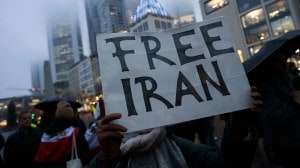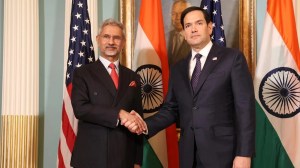Batting for Britain
Britain and the US have reluctantly, accepted the UN Secretary general's deal with Iraq. But their military build-up in the region remains i...

Britain and the US have reluctantly, accepted the UN Secretary general8217;s deal with Iraq. But their military build-up in the region remains intact and British generals have claimed that their presence was a factor in achieving the deal with Iraq. What Britain and the US have ignored this time, as they did in 1991, is that they are in the Gulf because they armed Iraq over a period running into the mid-1990s.
The US and Britain have a great deal of interest in the quot;instabilityquot; in the Middle East. Instability implies the possibilities of a market for arms, and the US and Britain are the world8217;s largest exporters of arms, and the Middle East is their most lucrative market. Britain is by far the big player in the EU.
It accounts for 55 per cent of European arms exports to the world of which the EU8217;s share is 33 per cent. Britain8217;s arms exports to West Asia account for at least twice its total arms exports to the rest of the world, and over 90 per cent of all EU arms exports to the region. In the mid-90s theBritish government had to admit that in contravention of its own guidelines it had actively promoted the sale of arms, and now it appears, components of biological warfare to Iraq. Margaret Thatcher called this quot;batting for Britainquot;, i.e. putting Britain8217;s business interests above everything else.
This week Government officials from EU member countries have started a process of negotiation on a joint code of conduct on arms sales to take into account criteria like regional stability, human rights and development.
But, in its current Anglo-French draft format the code of conduct, apart from being non-statutory, is full of holes. Its unspecified format for consultation and information sharing, its ambiguous definition of its primary criteria, and its lack of any explicit monitoring provision would pretty much allow an arms exporting country to continue with business as usual. The draft proposal on the basis of which negotiations have started is based on the British government8217;s own guidelines agreed lastsummer. Guidelines which, the government claimed, would take on board its quot;ethical foreign policyquot;. But these guidelines, which continue to allow export licenses to be granted without parliamentary scrutiny, appear to make a mockery of the quot;ethical foreign policyquot;.
In fact, on the basis of the new guidelines Britain has approved 22 export licences for ammunition, bombs and surveillance equipment to Indonesia. This despite well-documented evidence of a government supported military campaign against the civilian population of the island of East Timor. Britain has also approved 86 separate licences for the export of armoured vehicle, mortars and rifles to Turkey, which has been kept out of the EU for, among other things, its human rights record.
Campaigners in Britain are optimistic that a change in government in Istanbul has brought a change in attitude to the arms industry and arms exports. The willingness to negotiate a code of conduct is, they say, part of the change. They insist that there is apolitical will in the foreign office to move the country towards a more quot;ethicalquot; arms policy. Yet, they are forced to admit that while the Foreign Office may have the will, neither the Ministry of Defence nor the Trade and Industry Ministry, nor for that matter Downing Street, have shown the least interest in helping it promote its ethical policy. They also accept that while the Labour Party in its manifesto promised to set up a quot;conversion agencyquot; to assist in transforming defence manufacturing to civilian use, they have, quietly dropped this idea.
In fact, British ministers have on several occasions underlined the importance of the defence industry to the British economy. It is well known that the British defence industry far from being the great economic success story relies on heavy government subsidies. An important form of the subsidy is the export credit guarantee scheme. Under this scheme the British government guarantees loans from British banks to countries that want to buy arms from Britain.According to the World Development Movement, the British government has paid out an average of Aring;ldquo;380 million a year against loan defaulters. Among its rather badly judged debtors is Iraq, which defaulted on between Aring;ldquo;600 million and Aring;ldquo;1 billion of loan and credit arrangements underwritten by the ECGD.
The curious thing is that Margaret Thatcher personally negotiated loans for Iraq, and believed that she was enhancing her countries chances of becoming its quot;preferred creditorquot;. She and her minister subverted their own guidelines in order to sell everything from ammunition to precision instruments necessary for nuclear weapons to the growth medium on which anthrax is bred to keep Iraq8217;s markets open for Britain. It is the growth medium that has become the sticking point between the UN inspectors and Iraq. The argument in Britain in defence of arms sales as always is quot;jobsquot;. They claim that the defence industry employs several tens of thousands of people, and that reduction in its size would put too many peopleout of work. But even Trade Union bosses in Britain are not buying the jobs argument. In a letter to the Financial Times they said the defence industry could not sustain itself despite government subsidies because its markets were shrinking globally and called on the government to reduce its support to the defence sector. quot;Ethicalquot; is not a word the British government can claim to understand the meaning of, unless, it accepts that putting lives of people outside Britain at risk, in order to keep Britons in work is wrong. Britain has to accept that selling arms to a region which is politically unstable is not the best way of ensuring its security or guaranteeing its stability.
- 01
- 02
- 03
- 04
- 05































